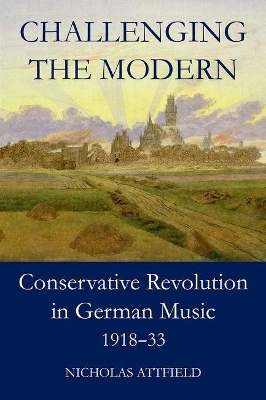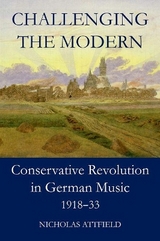Challenging the Modern
Oxford University Press (Verlag)
978-0-19-726613-7 (ISBN)
This book challenges commonplace conceptions of musical conservatism during Germany's Weimar Republic (1918-1933). Its primary goal is to offer scrutiny of uncritical links often made by musicologists and historians between musical conservatism and political conservatism of the era. It does so through a critical and nuanced application of the term 'conservative revolution', as used throughout the Weimar era and popularised in its historiography after 1945.
After an opening discussion of the time-honoured notion of 'Weimar Culture' and its tendency to obscure parts of the contemporary cultural landscape (and their relation to modernity and modernism), the book presents four contrasting studies, each focused on a particular 'conservative' musical figure or movement, and informed by readings of a complex discourse drawn together from contemporary journals, speeches, letters, scores, and archival sources. The first two studies address Thomas Mann and his relationship with Hans Pfitzner in the aftermath of the First World War, and Alfred Heuss's 1920s tenure as editor of Schumann's Zeitschrift für Musik. The second two studies turn to the so-called 'Bruckner-Cult' of the Weimar era and its representations of its central composer as medieval mystic, and the work of August Halm - another dedicated Brucknerian - within the German Youth Movement, as defined by the radical pedagogue Gustav Wyneken. An extended epilogue considers advocacy for these Weimar-era 'revolutionary conservatisms' under the Nazi regime after 1933.
Nicholas Attfield holds a BMus from King's College, London and an MSt and DPhil from St. Catherine's College, University of Oxford, the latter with a graduate year as Procter Visiting Fellow at Princeton University. In 2007 he was DAAD Michael Foster Fellow at Humboldt-Universität, Berlin, before taking up a British Academy Postdoctoral Fellowship at Oxford, with three months as Visiting Scholar at the Center for European Studies, Harvard University. Former posts include Lectureships in Music at Worcester College and Christ Church, Oxford, and a Teaching Fellowship in Music at Edinburgh University.
Introduction: Weimar Culture and its Others
1: Music and the Idea of 'Conservative Revolution'
2: 'Sympathie mit dem Tode': Thomas Mann, Hans Pfitzner, and the Further Reflections of a Non-Political Man
3: 'Innerer Betrachtung gewidmet': Alfred Heuss, the Zeitschrift für Musik, and the Music Journal as Community
4: 'Der alte treue Meister Antonius': Mysticism, Nation, and the Weimar Bruckner Cult
5: 'Eine neue, edle deutsche Jugendkultur': August Halm, Gustav Wyneken, and the Question of Leadership
Epilogue: Working Towards the Third Reich
Appendix: Transcription and Translation of Paul Hindemith's letter to Alfred Heuss, February 1923
| Erscheinungsdatum | 28.09.2017 |
|---|---|
| Reihe/Serie | British Academy Monographs Series |
| Zusatzinfo | 4 b&w illustrations |
| Verlagsort | Oxford |
| Sprache | englisch |
| Maße | 168 x 240 mm |
| Gewicht | 536 g |
| Themenwelt | Kunst / Musik / Theater ► Musik ► Klassik / Oper / Musical |
| Kunst / Musik / Theater ► Musik ► Musiktheorie / Musiklehre | |
| Geschichte ► Allgemeine Geschichte ► Neuzeit (bis 1918) | |
| Geisteswissenschaften ► Geschichte ► Regional- / Ländergeschichte | |
| ISBN-10 | 0-19-726613-4 / 0197266134 |
| ISBN-13 | 978-0-19-726613-7 / 9780197266137 |
| Zustand | Neuware |
| Haben Sie eine Frage zum Produkt? |
aus dem Bereich




